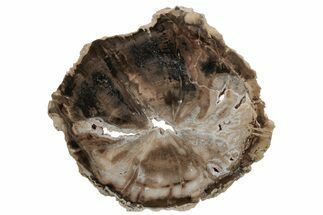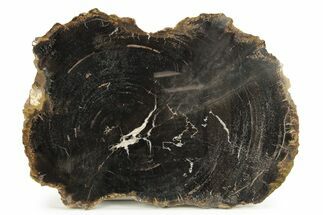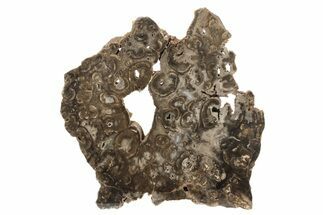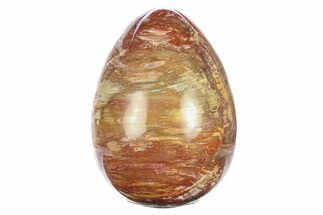6.4" Triassic Petrified Wood (Woodworthia) Round - Zimbabwe
This is a beautiful, polished slab of Triassic aged petrified wood collected near Gokwe, Zimbabwe. It is from Woodworthia, a primitive conifer and the green coloration can be attributed to chromium impurities. One side has been polished to a mirror like finish, showing off the gorgeous inner wood detail.
There is a quartz crystal filled pocket at the center of this slab. It comes with an acrylic display stand.
There is a quartz crystal filled pocket at the center of this slab. It comes with an acrylic display stand.
What Is Petrified Wood
Petrified wood is the name given to wood that has been turned into stone (fossilized) through the process of permineralization. In this process, all of the organic matter becomes replaced by minerals, while much of the original structure, such as tree rings, is retained. For this to happen, the wood needs to be buried in an environment low in oxygen to prevent decomposition and with flowing, mineral-laden water, so minerals may replace structures. The coloration is caused by various minerals that present in that water during fossilization. For example, red colors are due to iron compounds, greens due to copper, and so on.
Petrified wood is the name given to wood that has been turned into stone (fossilized) through the process of permineralization. In this process, all of the organic matter becomes replaced by minerals, while much of the original structure, such as tree rings, is retained. For this to happen, the wood needs to be buried in an environment low in oxygen to prevent decomposition and with flowing, mineral-laden water, so minerals may replace structures. The coloration is caused by various minerals that present in that water during fossilization. For example, red colors are due to iron compounds, greens due to copper, and so on.
$89
SPECIES
Woodworthia (Primitive Conifer)
AGE
LOCATION
Gokwe, Zimbabwe
FORMATION
Molteno Formation
SIZE
6.4 x 5.9", .45" thick
CATEGORY
SUB CATEGORY
ITEM
#167939
We guarantee the authenticity of all of our specimens.
 Reviews
Reviews











